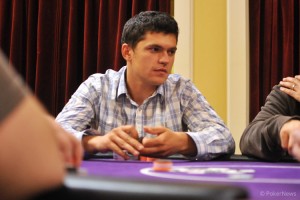In my past two columns, I analyzed a hand from a $1-$2 cash game in which our hero got into a challenging spot with 
 . Since he was new to the table, I really would’ve preferred him to fold preflop so as not to get into a predicament so early in the session.
. Since he was new to the table, I really would’ve preferred him to fold preflop so as not to get into a predicament so early in the session.
One of the players, who limped and then called our raise, bet $10 into a $48 pot on a 

 flop. Because of the analysis in my last column and us being in a “way ahead or way behind” situation, I’d like our hero to just call. However, seeing it simply like he smashed the flop, he raised to $50. What our hero was not thinking about was, “Can I get a better hand to fold or worse hand to call?” This is a key question you have to think to yourself before deciding if you’re going to bet or raise.
flop. Because of the analysis in my last column and us being in a “way ahead or way behind” situation, I’d like our hero to just call. However, seeing it simply like he smashed the flop, he raised to $50. What our hero was not thinking about was, “Can I get a better hand to fold or worse hand to call?” This is a key question you have to think to yourself before deciding if you’re going to bet or raise.
With this board, I don’t think any worse hands will call, nor will any better hands fold, so at this point our hero should have just called. Also, our opponent only started the hand with $140, so we’re letting him know he’ll be committed to the pot if he continues. He happens to just call, which is exactly what I would do with a big hand and wanted to get all the money in the pot.
Coming back over the top would get my opponent to fold worse hands and I expect him to put me all-in on the turn if I just call on the flop.
The turn was the  , giving our hero top two pair. The opponent checked to our hero and he naturally put the opponent all-in for his remaining $65. The opponent quickly called and had
, giving our hero top two pair. The opponent checked to our hero and he naturally put the opponent all-in for his remaining $65. The opponent quickly called and had 
 in the hole for bottom set. The river was no help to our hero and he lost $140 in his first hand played at the table. He gained information about the opponent that he will likely play his hands
in the hole for bottom set. The river was no help to our hero and he lost $140 in his first hand played at the table. He gained information about the opponent that he will likely play his hands
straightforwardly, but he could’ve found out this information cheaper by slowing down and thinking during the hand.
KEY POINTS: When new to the table, don’t be in a rush to play. Take time to get adjusted and don’t get yourself into difficult spots playing hands such as K-J in multiway pots.
• Before betting or raising, think about two questions: “Am I in a way-ahead or way-behind situation?” and “Can I get a better hand to fold or a worse hand to call?”
Note how many concepts can be analyzed in just one hand. Be sure to not just chalk it up to a cooler, but look at everything you can learn from the hand to win more or lose less in future hands. Learn to be thankful for many of the hands you lose because of how much you learn from analyzing them objectively.
Decide to Win!
— Lee Childs is the founder and lead instructor at Inside the Minds. For information about his group training sessions and personal coaching, visit inside-the-minds.com.




